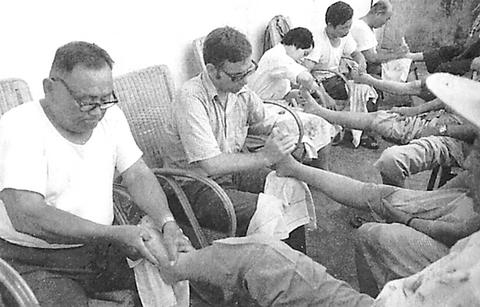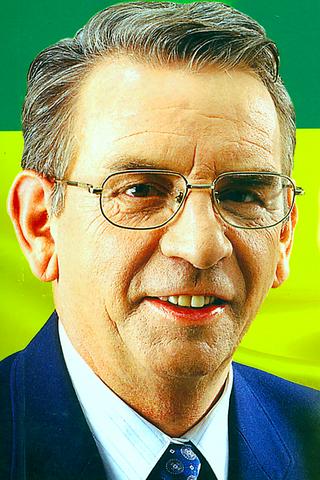Father Josef Eugster may not be the best evangelist for converting people to Christianity. He may not have touched the hearts of millions of Taiwanese, but he's easily Taiwan's most famous and influencial foreign priest for having touched people's feet. He declares his pioneering foot massage in Taiwan to be "God's gift."
"This is Chang-pin Catholic Church, I'm Father Wu Ro-shih," 62-year-old Eugster said in fluent Mandarin when answering a phone call from the Taipei Times. Actually, Father Eugster's accent is more Taiwanese because the first language he learned when arriving in Taiwan 30 years ago was Taiwanese.

PHOTO COURTESY OF FATHER JOSEF EUGSTER
Back then, a shy young man from the Swiss village of Berneck came to Taiwan's east coast town of Taitung, where people pray in shrines and Amis Aborigines hunt and hold ceremonies by the sea. The only plan he had in mind was to serve God. But how?

PHOTO COURTESY OF COSMAX PUBLISHING
"It is really difficult to try to preach to Taiwanese!" Father Eugster said. He recalled that during his first few years in Taitung, his sermons always made people doze off. "I prayed to God, asking him to give me a good method for preaching, and then He made me sick," Eugster said. Now he says he's grateful that he was troubled by arthritis -- if he weren't, he would not have read the book about reflexology and began massaging first his own and then other people's feet.
When an old man was leaving the church following mass, he looked uninterested in my sermon and complained of a headache. "I grabbed his feet, saying `please give me five minutes,'" Eugster said. "I showed him, `here is a reflex area for your headache' and began massaging it for him." Like that, Eugster found his new method of preaching. Unlike other Western priests, who often bring rice or flour to remote villages, Father Eugster brings his hands.
His Taitung Catholic church has been packed ever since. There are often even hundreds of people lined up at the door of the church at midnight. One time, Eugster was too exhausted from doing massage and fell ill with nephritis. "I was hospitalized and couldn't do any massage, so I asked them to go to the beach to find pebbles to step on," Eugster said. This became the origin of "pebble paths" meandering through many of Taiwan's parks.
"Ninety percent of the people came to the church just for their health problems, only 10 percent were interested in the spiritual," Eugster said. But he never gives up hope. "Maybe in 10, 20 years, they will want to listen to God's words," he said.
Fame has brought its share of trouble. In 1980, people abusing his name began prescribing medicine. His taxes were checked and the Department of Health charged him with practicing medicine without a doctor's certificate. "I even received calls [from people] threatening to kill me," he said.
Eugster took an eight-month leave to study in Jerusalem. "I was actually suffering from neurasthenia and couldn't sleep at nights. I needed a break to find myself again," he said.
As foot massage became popular in urban areas, with his name and picture widely printed on clinics' signboards, Father Eugster returned to Taiwan's remote villages. Back from Jerusalem, he was transferred to Chang-ping, a small village at the border between Hualien and Taitung, distancing himself from money and fame.
"This is the most beautiful place in the world, with mountains and the sea. I have a farm for growing vegetables and I often go swimming in the sea, and sometimes fishing," he said.
Now with his schedule packed with speaking engagements, visiting a circuit of churches Amis tribes and practicing massage, Eugster has managed to find some time to learn the Amis language.
Surprisingly, even after 23 years of having massaged celebrities and politicians, his charge remains a modest NT$350 for a half-hour massage, lower than in most clinics.
Despite his fame, Father Josef Eugster remains a simple man. "Two months ago, I was given an air-conditioner, donated by disciples. It was my first air-conditioner," Eugster said.

On April 26, The Lancet published a letter from two doctors at Taichung-based China Medical University Hospital (CMUH) warning that “Taiwan’s Health Care System is on the Brink of Collapse.” The authors said that “Years of policy inaction and mismanagement of resources have led to the National Health Insurance system operating under unsustainable conditions.” The pushback was immediate. Errors in the paper were quickly identified and publicized, to discredit the authors (the hospital apologized). CNA reported that CMUH said the letter described Taiwan in 2021 as having 62 nurses per 10,000 people, when the correct number was 78 nurses per 10,000

As we live longer, our risk of cognitive impairment is increasing. How can we delay the onset of symptoms? Do we have to give up every indulgence or can small changes make a difference? We asked neurologists for tips on how to keep our brains healthy for life. TAKE CARE OF YOUR HEALTH “All of the sensible things that apply to bodily health apply to brain health,” says Suzanne O’Sullivan, a consultant in neurology at the National Hospital for Neurology and Neurosurgery in London, and the author of The Age of Diagnosis. “When you’re 20, you can get away with absolute

May 5 to May 11 What started out as friction between Taiwanese students at Taichung First High School and a Japanese head cook escalated dramatically over the first two weeks of May 1927. It began on April 30 when the cook’s wife knew that lotus starch used in that night’s dinner had rat feces in it, but failed to inform staff until the meal was already prepared. The students believed that her silence was intentional, and filed a complaint. The school’s Japanese administrators sided with the cook’s family, dismissing the students as troublemakers and clamping down on their freedoms — with

As Donald Trump’s executive order in March led to the shuttering of Voice of America (VOA) — the global broadcaster whose roots date back to the fight against Nazi propaganda — he quickly attracted support from figures not used to aligning themselves with any US administration. Trump had ordered the US Agency for Global Media, the federal agency that funds VOA and other groups promoting independent journalism overseas, to be “eliminated to the maximum extent consistent with applicable law.” The decision suddenly halted programming in 49 languages to more than 425 million people. In Moscow, Margarita Simonyan, the hardline editor-in-chief of the